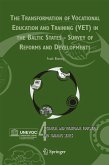In this volume, the authors treat flexibility as a system characteristic of Vocational Education and Training (VET), in analyzing key conditions for flexibility: -economic context of VET and the organizational and institutional design of VET; -educational tools and resources for the flexibility of delivery and pathways at national level; -VET professionals as promoters of flexibility, mobility, and transferability.
Flexibility seems to be the core concept of economic and educational change in our time. The promise of solutions to many problems at the individual, institutional, and national level evokes as much controversy as acclaim. This might be related to the different perspectives of actors and researchers involved in problem-solving in Vocational Education and Training (VET), where, on the one hand, solutions should be sought in key qualifications and transferability, in changing teaching and learning processes, while, on the other, political, institutional, organisational, and professional conditions are seen as the key interventions to build a responsive workforce on the basis of a re-engineered VET system. Consequently, flexibility in connection with vocational education and training and the labour market has several divergent connotations.
Flexibility seems to be the core concept of economic and educational change in our time. The promise of solutions to many problems at the individual, institutional, and national level evokes as much controversy as acclaim. This might be related to the different perspectives of actors and researchers involved in problem-solving in Vocational Education and Training (VET), where, on the one hand, solutions should be sought in key qualifications and transferability, in changing teaching and learning processes, while, on the other, political, institutional, organisational, and professional conditions are seen as the key interventions to build a responsive workforce on the basis of a re-engineered VET system. Consequently, flexibility in connection with vocational education and training and the labour market has several divergent connotations.








